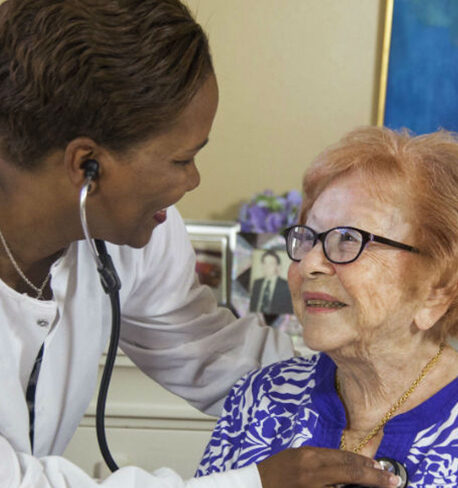As the primary caregiver of an older adult, you have a lot of responsibilities. You are responsible for the day-to-day care of your loved one, as well as housework, errands, and finances. You are also their healthcare advocate and maybe the primary decision maker when it comes to medical care.
With all these responsibilities, it’s important to do everything you can to develop a relationship and streamline communications with your senior loved one’s doctor. When speaking with their doctor, keep the following objectives in mind:
- To have your concerns heard and understood
- To understand the diagnosis, treatment options, and likely outcome
- To know what steps for ongoing care will be needed
Here are a few tips to help you get achieve each of these objectives.
Communicating with a Physician on a Senior Loved One’s Behalf
- Find out the best time to talk to your loved one’s doctor.
If you’re in the emergency room with your loved one, there’s no doubt you’ll need to speak with the healthcare professionals. But if you have follow-up questions after an office visit or after receiving test results, you may have some flexibility. Ask the receptionist for the best time to reach the doctor to have an in-depth conversation. This gives you time to collect your thoughts and compile a list of questions, while also ensuring you have the doctor’s attention. - Make a list of key points and questions before you speak.
As your loved one’s primary caregiver, you’re on the front lines. Write down questions or observations about your loved one’s behavior as they come up. You’ll be better prepared to answer the doctor’s questions about your loved one’s health and frame-of-mind. And you’ll be ready to ask questions of your own. - Don’t be intimidated. And don’t be afraid to ask for clarification if you don’t understand.
Even the most confident adults can get a hint of “white coat syndrome,” or feel intimidated when speaking to doctors. Remember, doctors are human beings, too.Take a deep breath, collect your thoughts, and don’t hesitate to ask the doctor to slow down, explain medical jargon, or even repeat a statement if you don’t understand.
If a doctor repeatedly talks down to you or seems annoyed by your questions, it may be time to find a different physician. You can’t ensure your loved one is getting the best quality of care if you can’t communicate with their doctor.
- Write everything down (or record it).
It’s important to take notes for your own reference and to share the information with your aging loved one or other adults involved in their care, such as siblings.You can use the recorder on your smartphone to record a conversation. Just make sure to ask the doctor first. Although it’s fully legal to record a conversation secretly (except in California and Florida) it’s polite to ask for permission.
- Maintain your own medical file for your loved one.
Keeping a written record of all conversations with your loved one’s medical providers, as well as all healthcare paperwork, makes it easy to refer to these notes during conversations.This also allows you to share information with others involved in your loved one’s care. It can be especially helpful if you share caregiving duties with siblings, home health aides, or staff in a senior living community.
Life Lived to the Fullest
We extend an open invitation to you to visit us and more about assisted living at a Five Star community. Contact the community nearest you today to arrange a private tour!

